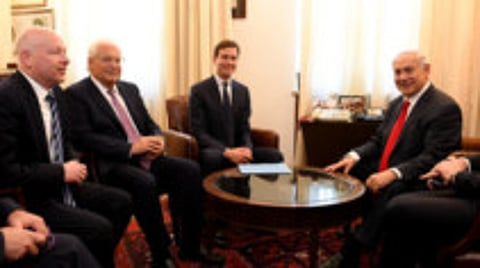Trump team keeps Middle East peace plan secret
Plan is expected to be hugely biased in Israel’s favour

Washington: In a White House where no secret is safe for long, one development has remained stubbornly confidential - the contents of a Middle East peace plan authored by President Donald Trump’s advisers Jared Kushner and Jason Greenblatt.
With Trump having delighted Israelis and angered Palestinians by recognising Occupied Jerusalem as Israel’s capital in 2017 and moving the American Embassy to the holy city last May, a US-brokered peace deal may seem farther away now than when talks collapsed five years ago.
Then on Wednesday, Israeli Prime Minister Benjamin Netanyahu secured a clear path to re-election, only days after proposing to annex Jewish West Bank colonies, viewed as illegal by the international community
The Trump administration has yet to comment on the election-eve remarks.
Aides expect Trump to release the plan once Netanyahu forms a government coalition, and officials say that despite criticism of the administration’s moves to date, the plan will demand compromises from both sides.
That the peace plan has remained a secret is remarkable in a White House where drafts of executive orders, confidential conversations and internal deliberations all find their way to the front pages.
Kushner and Greenblatt have limited the plan’s distribution over the two years they have been crafting it.
It has been kept secret “to ensure people approach it with an open mind” when it is released, a senior administration official said.
Only four people have regular access - Kushner, Greenblatt, US Ambassador to Israel David Friedman and Kushner aide Avi Berkowitz, the official said.
Trump is briefed regularly on the contents but is not believed to have read the entire document of dozens of pages.
“He is briefed if something interesting is happening or there is an idea they want to run by him,” the official said.
Kushner, a New York real estate developer and husband of Trump’s daughter Ivanka, and Greenblatt, a former lawyer for Trump, joined the process knowing little about the tortured, decades-long path in search of Arab-Israeli peace.
Their proposal addresses such core political issues as the status of Occupied Jerusalem, and separately aims at helping the Palestinians strengthen their economy.
Palestinians expect it to be extremely biased in Israel’s favour and say it will be dead on arrival.
Cloaked in secrecy is whether the plan will propose outright the creation of a Palestinian state, the Palestinians’ core demand.
On Wednesday, Trump’s secretary of state Mike Pompeo said the plan would be presented before too long but, when asked, declined to say whether the administration favoured a two-state solution, long the basis of Middle East peacemaking.
Not even Trump, who is known to blurt out news whenever he feels like it, has dribbled out details of the peace plan because of the sensitivity.
He tells his Middle East envoys, “If you guys can get this done you’re going to be the greatest negotiators in history,” said a senior White House official.
Palestinians disagree.
“The extremist and militaristic agenda, led by Benjamin Netanyahu, has been emboldened by the Trump administration’s reckless policies and blind support,” said PLO Executive Committee Member Hanan Ashrawi.
US Vice President Mike Pence, Pompeo and White House national security adviser John Bolton are all kept up to date on the peace plan, but have kept a hands-off approach to it, deferring to Kushner, two other officials said.



